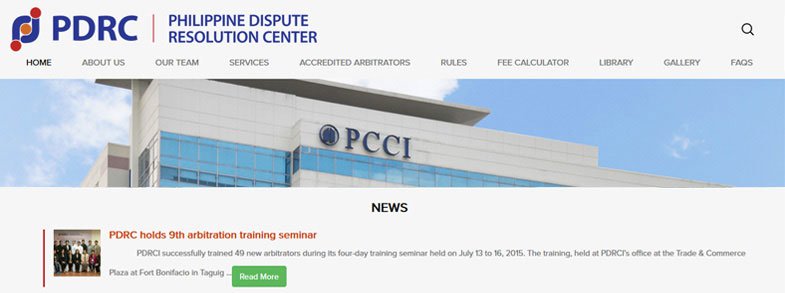
The Board of Trustees approved PDRC’s new website at the meeting of the Board on December 14, 2015. During the presentation by Asst. Secretary General Francisco Pabilla, Jr., the Trustees suggested some changes to enhance the website features.
The new PDRC website went live last January 19, 2016. It contains news on developments and upcoming events on alternative dispute resolution in the Philippines and other countries. It has custom graphics and user-friendly features like a fee calculator that estimates the cost of arbitration based on the claimant’s claim and the respondent’s counterclaim.
The site features a fully downloadable version of the 2015 PDRC Arbitration Rules; the latest and archived copies of The Philippine ADR Review monthly newsletter, which can also be viewed online; photo gallery of important events and milestones; web linkages to PDRC’s local and foreign partner organizations; and FAQs. PDRC’s members, trained arbitrators, and accredited arbitrators are listed online. To locate the PDRC office from any point in Manila, there is a builtin Google map locator.
The website can be accessed at www.pdrci.org by using any digital device, including smartphones.
Enforcement Of Arbitral Awards In India
 Enforcing a foreign arbitral award in India is extremely dif ficult if the arbitral award is based on an arbitration agreement which was executed prior to September 7, 2012.
Enforcing a foreign arbitral award in India is extremely dif ficult if the arbitral award is based on an arbitration agreement which was executed prior to September 7, 2012.
In most cases, Indian courts will treat such arbitral awards issued abroad as domestic awards. Based on the judgment of the Indian Supreme Court in Bharat Aluminium Co. v. Kaiser Aluminium Technical Service, Inc. of September 6, 2012 and earlier precedents, courts in India will continue to misapply and misinterpret the Indian Arbitration and Conciliation Act, 1996 (Arbitration Act 1996) as well as the Convention on the Enforcement of Foreign Arbitral Awards (New York Convention) if the arbitration agreement was executed prior to September 7, 2012. The new Arbitration and Conciliation (Amendment) Act, 2015 (Arbitration Amendment Act 2015), which was published in the Gazette of India on January 1, 2016, did not change this at all; the Arbitration Amendment Act 2015 is applicable for all arbitration proceedings filed since October 23, 2015 and thereafter. The Arbitration Amendment Act 2015 did not abolish the bifurcation of the Indian Arbitration Law in one which is applicable for all arbitration disputes based upon the arbitration agreement executed up to September 6, 2012, and one which is applicable for disputes based upon arbitration agreements which are executed after September 6, 2012, and it also did not cure all the other defects and missapplications of the Arbitration Act 1996 with respect to foreign arbitral awards. However, the Arbitration Amendment Act 2015 created an additional arbitration law for arbitration agreements which were executed between September 6, 2012 and October 23, 2015, additional new rules for arbitral proceedings which were initiated since October 23, 2015 and foreign awards issued in such proceedings; further, the Arbitration Amendment Act 2015 permits interim relief in arbitration proceedings filed in one of the 47 out of 156 member states of the New York Convention since October 23, 2015.
If a foreign company is interested in an efficient arbitral proceeding and in enforcing a foreign arbitral award in India, it must replace an existing arbitration agreement or arbitration clause with a new one. Only by replacing such an old arbitration agreement with a new one, Indian courts will treat an arbitral award issued for example in the Philippines, Singapore, Hong Kong, England, France, Germany, Switzerland or U.S.A. as a foreign arbitral award which cannot be set aside by courts in India.
New arbitration law will apply only to new arbitration agreements
For many years, India has a bad reputation with respect to enforcing foreign arbitral awards because most Indian companies do not honor and fulfil a foreign arbitral award without any enforcement proceeding. Of ten, the receipt of a foreign arbitral award is only the start of the next round of litigation, and the losing domestic or foreign company may even apply to set aside a foreign arbitral award in India.
However, there is new hope. In January and February 2012, the Constitution Bench of the Indian Supreme Court heard for 20 days the arguments and pleadings in Bharat Aluminium. The Constitutional Bench held that the Supreme Court had, especially in the cases of Bhatia International v. Bulk Trading S.A. of March 13, 2002 and Venture Global Engineering v. Satyam Computer Services Ltd. of January 8, 2008, misinterpreted, misapplied, and distorted the Arbitration Act 1996 and violated the spirit of the New York Convention.
Despite the fact that the Indian Supreme Court explained at least eleven times why it is “unable to agree with the conclusions recorded” in the mentioned judgments, the Supreme Court surprisingly contradicted its clear and convincing reasoning and held in the last paragraph of the judgment: “Thus, in order to complete justice, we hereby order, that the law now declared by this Court shall apply prospectively, to all the arbitration agreements executed hereafter.”
Therefore, the misinterpreted, misapplied, and distorted interpretations of the Arbitration Act 1996 will remain applicable for many thousands of arbitration agreements if the parties do not execute new arbitration agreements after September 6, 2012. Only arbitration agreements which were executed after September 6, 2012 will benefit from the new interpretation of the arbitration law in the Bharat Aluminium judgment. What will be different for arbitration agreements executed after September 6, 2012? In short, an award rendered in one of 47 out of the 156 in India recognized New York Convention countries will be recognized as a foreign arbitral award even if it is governed by Indian law, and such awards cannot be set aside anymore in India. But all these positive developments will benefit domestic and foreign parties only if the arbitration agreement was executed after September 6, 2012.
Application of Indian law will no longer transform a foreign arbitral award into a domestic award if the arbitration agreement was executed after September 6, 2012
Prior to September 6, 2012, India misinterpreted the term “foreign arbitral award” under the New York Convention in two central points.
Under Art. I para. 1 sentence 1 of the New York Convention, foreign arbitral awards are awards which were “made in the territory of a State other than the State where the recognition and enforcement of such awards are sought.” India was among the first ten countries who signed the New York Convention on June 10, 1958, and it ratified it on June 13, 1960.
However, India has a long tradition of misinterpreting the term “foreign arbitral awards” by only recognizing awards as foreign awards if they are made in one of the 47 states out of the 156 states which ratified or acceeded to the New York Convention. Not to recognize arbitral awards issued in one of the 109 other states as foreign awards is a breach of India’s obligation under Art. III of the New York Convention.
However, the 47 states include, among others, the Philippines, China, Hong Kong, Japan, Korea, Malaysia, Singapore, Russia, 18 of the EU member states, Switzerland, and the U.S.A.; therefore, the practical relevance of this violation is not really material since most arbitral proceedings with Indian companies will have their seats in one of the 47 states. The Bharat Aluminium decision did not address this restriction; therefore, this restriction is still valid.
But the Bharat Aluminium judgment addressed another restriction: Even if an award was made in one of the the 47 recognized New York Convention states, such award will not be treated as a foreign arbitral award if the dispute was governed totally or partially by Indian law if the arbitration agreement was executed prior to September 7, 2012. This restriction was stipulated in Section 9 (b) of the Foreign Awards (Recognition and Enforcement) Act, 1961; this 1961 Act had copied a similar provision in Section 9 (b) of the Indian Arbitration (Protocol and Convention) Act, 1937.
Based on Section 9 (b) of the 1961 Act, the Indian Supreme Court set aside foreign arbitral awards in the cases National Thermal Power Corporation v. Singer Company & Ors. and ONGC v. Western Company of North America. The Arbitration Act 1996 no longer contained such provision. However, the Indian Supreme Court held in Thyssen Stahlunion GmbH v. Steel Authority of India Ltd that this restriction would also be applicable under the Arbitration Act 1996. This judgment was overruled in Bharat Aluminium, and the Supreme Court held that the Arbitration Act 1996 intentionally deleted Section 9 (b) of the Foreign Awards Act, 1961. But this judgment will only apply to arbitration agreements executed after September 6, 2012. Therefore, only awards made under a new arbitration agreement on disputes governed by Indian law in one of the recognized 47 Convention states will be treated as foreign arbitral awards.
Indian courts may set aside foreign awards if the arbitration agreements was executed prior September 7, 2012
Based on the judgment of the Indian Supreme Court in the cases Bhatia International and Venture Global, most foreign arbitral awards can be set aside in India if the parties executed the arbitration agreement prior to September 7, 2012.
In Bhatia International, the Indian Supreme Court held that Part I of the Arbitration Act 1996 would apply to all arbitrations and to all proceedings relating thereto. Based on Bhatia International, Indian courts will assume jurisdiction to set aside any foreign arbitral award under Section 34 (2) of the Arbitration Act 1996 if the arbitration agreement was executed prior to September 7, 2012 and the parties have not contractually excluded Part I of the Arbitration Act 1996 whether or not a party wants to enforce such foreign award in India.
However, based on the Arbitration and Conciliation (Amendment) Ordinance, 2015, which also amended Art. 34 (2), a foreign arbitral award seems no longer to violate domestic public policy of India even if such award is in conflict with any part of Indian law or is contrary to the terms of the contract or if the agreement is based on unequal bargaining power.
In 2008, a bench of two judges of the Indian Supreme Court was asked by Venture Global Engineering (VGE), a U.S. corporation, to set aside an arbitral award made under the LCIA Rules in London, England. Satyam Computer Services Ltd. (Satyam) and VGE had entered into a joint venture agreement creating an Indian JV Company. The joint venture agreement was governed by the laws of Michigan, but it was additionally stipulated that the shareholders shall at all times act in accordance with the Indian Companies Act being in force in India at any time.
